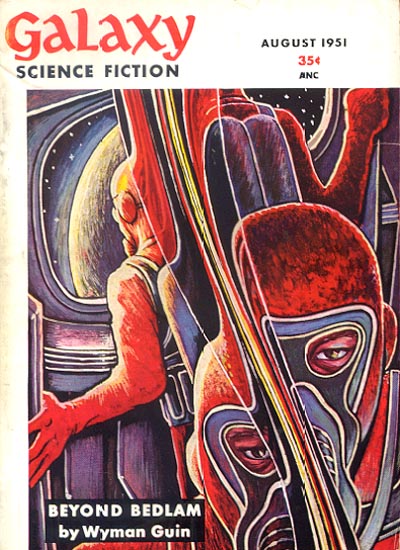 First appeared in H.L. Gold's Galaxy. Reprinted by H. L. Gold, Kingsley Amis, Robert Conquest, Robert Silverberg, Martin H. Greenberg--Silverberg especially collected it in various genre retrospectives.
First appeared in H.L. Gold's Galaxy. Reprinted by H. L. Gold, Kingsley Amis, Robert Conquest, Robert Silverberg, Martin H. Greenberg--Silverberg especially collected it in various genre retrospectives. In 2013, Wyman Guin was awarded the Cordwainer Smith Rediscovery Award "to honour notable sf and fantasy authors who in the view of the judging panel did not receive or no longer receive the attention they deserve." --SFE
Humans are divided into two personalities [Note: What's called schizophrenia in the text is actually Multiple Personality Disorder--two mental disorder often confused. Oddly, no one's pointed that out yet, but it doesn't really undermine the text], where each manifests for two days at a time. In the past--our present--people lived with the personalities together, personalities which would undermine each. In fact, we are all naturally schizophrenic (2nd meaning) and the latest drugs help us deal with these warring sides of our personalities. This supposedly has the added effect of stopping all wars.
They also each administered a "hypothalamic block" to prevent subconscious thoughts and actions. Everything is above board. No hidden secrets remain hidden beneath to cause wars. This is also said to make people more logical.
Within this scenario is an unusual family, unusual because both personalities of a person (Conrad and Bill) are married to both personalities of another person (Helena and Clara). Normally they only see the one wife, but Bill wanted to see what the other personality was like and falls madly in love with her. They both suppress shifting in order to see each. They are sinning since these personalities aren't married. Slowly the cogs of society catch on to what the couple is up to.
 Mary, daughter of one couple, feels unloved by the other couple, so she skips her drugs so she can find love from the other set. However, this set is cold. Mary isn't even genetically related. Nobody keeps their own children. Society decides whom the best match should be.
Mary, daughter of one couple, feels unloved by the other couple, so she skips her drugs so she can find love from the other set. However, this set is cold. Mary isn't even genetically related. Nobody keeps their own children. Society decides whom the best match should be.This is likely Guin's best work. John Clute calls it "brilliant" -- "ideally designed for Galaxy, with its focus (< Medicine; Identity; Psychology; Sociology) on the human implications involved in enduring the future."
Clute's not whistling Dixie. This is a tour de force--as every character has a twin, often very different. They do not see each other as two personalities living in the same person but as two separate entities, making the text a rich reading experience. One personality of a person you may be in love with, but the other no.
When compared to other works in Guin's oevre, a theme arises where couples tend to bump up against difficulties in their marriage. Some speculative element tends to intervene until the couple reestablishes themselves. It's more fascinating since one personality of a person may be far more attractive than another--for parent and child. It shades a whole new meaning on the phrase "My evil twin did it."
Mary behaves younger than a thirteen year old, but she is said to be immature for her age. What created the society seems implausible, but what a triptych once you arrive. This should be part of the SF canon. The final line is genius (said by one of the top officers in the society, Major Grey):
"It was a pretty wonderful society he lived in, he realized. How wouldn't trade it for the kind Bill Walden had wanted. Nobody in his right mind would."Note protagonist's last name, Walden. The title plays on two double meanings: bedlam (confusion or insane asylum) and beyond (as in past that point, or exceeding, at a higher degree). In other words, are we past insanity or increasing it? Are we past confusion or increasing it?
This story may require multiple readings to pick up all that's going on.
Edition: Beyond Bedlam and Other Stories by Wyman Guin

No comments:
Post a Comment